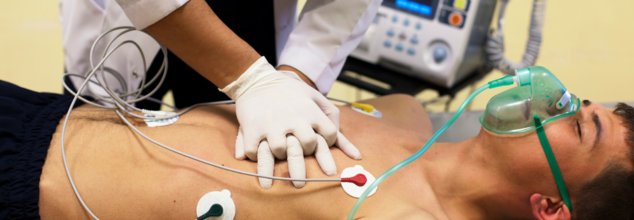- Health Conditions A-Z
- Health & Wellness
- Nutrition
- Fitness
- Health News
- Ayurveda
- Videos
- Medicine A-Z
- Parenting
- Web Stories
Research Reveals The Surprising Number Of Lifestyle Choices That Put Our Heart Health At Risk

(Credit-Canva)
Living a healthy lifestyle is crucial for your heart health. We all have heard this from our doctors, peers, as well as multiple studies across the internet. The number of things that could have a negative impact on your heart keeps seemingly increasing, leaving many of us wondering how many more things we should be aware of. New research has painted a clear picture for us and gives the exact number of everyday risks that could slash the risk of heart attack by 63%. In the study published in the Canadian Journal of Cardiology, researchers were surprised to find that removing 56 unfavorable profiles, could lower the chances of declining heart health.
This shows that what we do every day has a really big impact on our heart health and our chances of this happening.
The researchers compared the people who had a sudden cardiac arrest with those who stayed healthy. They looked at 125 different things that people can change, like what they eat, how much they exercise, if they smoke or drink, how they feel emotionally, and even things like their job and money situation. The place you live at can also be a factor as the study noted that things like air pollution, traffic proximity and intensity, the percentage of natural environment can also affect your heart health. This helped them figure out which of these things were most strongly linked to having a sudden cardiac arrest.
Preventable Variables To Look Out For
The study found 56 things in our daily lives, our surroundings, and our health that can lead to sudden cardiac arrest. If we pay attention to these things and make them better, like eating healthier or being more active, we might be able to stop up to 63% of these heart problems from happening. It's about looking at all the pieces of our lives.
The researchers expressed their astonishment over how many cases we could possibly prevent. He said that if people who have unhealthy habits or situations made improvements, we could see a big drop, somewhere between 40% and 63%, in the number of sudden cardiac arrests. This shows that making positive changes can have a much bigger effect than we might think.
How Did The Researchers Find This?
To learn more about what causes these heart problems, the researchers looked at a lot of information from a long-term health study in the UK. This study followed over 500,000 people for many years. During that time, more than 3,000 of them had a sudden cardiac arrest. By looking at all this data, the researchers could start to see patterns and find the things that might be increasing the risk.
The research draws attention towards the increasing numbers of people suffering with heart diseases in the world. According to the American Heart Association in just one year 436,000 American died due to cardiac arrests. Cardiovascular diseases are the leading cause of death globally, taking 17.9 million lives each year. Hence, changing a few necessary things to protect your heart could save your life in the long run.
Could Your Air Conditioning System Be Increasing The Risk Of 'Sick Building Syndrome'

Credits: Canva
For many people, air conditioning is the ultimate summer luxury. It turns stifling rooms into cool refuges, taming both heat and humidity. But here’s the part we don’t talk about enough—if your AC isn’t properly maintained, it can quietly turn into a delivery system for illness.
Researchers and health professionals have been warning about the connection between malfunctioning or poorly cleaned AC systems and a condition known as Sick Building Syndrome (SBS). The symptoms may seem mild at first—headaches, coughing, skin irritation—but in some cases, they can signal exposure to harmful bacteria, fungi, and even viruses circulating in your building’s air. This isn’t about making you afraid of AC—it’s about understanding the risks so you can keep the benefits without the downsides.
What Is Sick Building Syndrome?
Sick Building Syndrome is a catch-all term for symptoms that develop when you spend long periods in a particular indoor environment—especially one that relies heavily on air conditioning. The symptoms can vary, but common complaints include:
- Persistent cough or wheeze
- Runny or congested nose
- Headaches and dizziness
- Fatigue or trouble focusing
- Skin rashes or irritation
One hallmark of SBS is that the symptoms tend to ease once you leave the building and worsen when you return. While it’s most common in office workers, it can happen in any air-conditioned space, from hospitals to hotels.
A 2023 study from India provided some of the strongest evidence yet that prolonged exposure to air-conditioned environments can affect health. The researchers tracked 400 healthy adults—half working six to eight hours a day in AC offices, half in non-AC settings—over two years.
The results were striking: the AC group had more SBS symptoms, more allergies, and poorer lung function. They were also absent from work more often. These findings match earlier studies showing higher SBS prevalence among office workers in climate-controlled buildings compared to those in naturally ventilated spaces.
How AC Systems Become a Health Risk?
When air conditioners are working the way they should, they clean airborne impurities and control temperature and humidity. The problem arises when they are not regularly serviced or cleaned. Issues may involve:
1. Bacterial Growth
One of the greatest threats is Legionella pneumophila, the bacteria that cause Legionnaires' disease. This acute lung infection is transmitted when individuals breathe in small droplets of water with the bacteria on it. AC cooling towers, particularly for large buildings, are perfect breeding grounds if they are not well maintained.
They exhibit pneumonia-like symptoms—fever, cough, chest pain—and develop two to 14 days after becoming infected. In extreme situations, Legionnaires' disease can be life-threatening.
2. Fungal Contamination
Moisture and dust accumulation within AC systems provide ideal environments for fungal growth. In studies conducted within hospitals, fungi such as Aspergillus and Cladosporium were isolated in ventilation ducts. These fungi are potentially lethal for immunocompromised individuals, transplant patients, or premature infants.
Fungal infection may result in prolonged cough, loss of weight, and in some instances, extend beyond the lungs to the brain, kidneys, and other organs.
3. Viral Transmission
Even though most viruses are transmitted through person-to-person contact, air conditioners can, in specific circumstances, act as a source of airborne viral outbreaks. One case in point was in a Chinese kindergarten, where an outbreak of norovirus infecting 20 children was traced to the AC system in a bathroom.
Surprisingly, properly serviced AC systems can also minimize viral transmission, such as COVID-19, by filtering the air effectively—testimony that maintenance is the defining difference between protection and risk.
What Is the Role of Humidity?
Even if your AC is freshly cleaned, there's another sneaky way it can influence health: dehumidifying the air. Air conditioners tend to reduce indoor humidity to levels that can parch your nasal and throat membranes. These mucus membranes form part of the natural defense system of your body, catching and flushing out germs before they enter deeper tissues.
When they evaporate, they're not as effective, potentially allowing bacteria or fungi to more easily cause sinus or respiratory infections.
Should You Get Rid of Air Conditioners Completely?
It's worth noting that air conditioning itself is not necessarily dangerous—indeed, in extreme temperatures, it can be a matter of life and death. Research indicates that AC prevents heat-related illnesses and fatalities, particularly among susceptible populations such as the elderly.
The issue isn't the technology—it's how we use it. Neglected systems can turn a comfort into a disease machine. Properly maintained ones can clean indoor air, cut down on allergens, and help hot weather feel less oppressive.
All but a few AC-associated health hazards are avoidable with regular maintenance. That entails:
- Replacing or cleaning filters as the calendar dictates
- Servicing cooling towers and water systems to avoid Legionella growth
- Inspecting ducts for mold and dust buildup on a regular basis
- Maintaining humidity levels within a healthy limit (preferably 40–60%)
Missing out on these steps not only impacts air quality but can also cause your AC to work harder, wasting energy and reducing its lifespan.
How to Stay Safe?
If you spend a lot of time or work in an air-conditioned building, take note of your symptoms. If you notice an improvement when you are out of the building, it's worth bringing the matter to management or facilities personnel. In workplaces, maintenance of HVAC (heating, ventilation, and air conditioning) is usually a joint duty between employers and building owners.
At home, have professional maintenance at least annually, replace or clean filters as frequently as the manufacturer recommends, and clear vents of dust and debris. If your AC has a built-in humidifier, track indoor humidity levels.
Air conditioning doesn’t have to make you sick but without proper care, it can. Sick Building Syndrome is real, and while it’s not always caused by AC, neglected systems can be a major contributor. The fix isn’t to ditch cooling entirely it’s to treat the system in your home or workplace like the important health safeguard it can be when maintained correctly.
Health Warning Issued By UKHSA In England As Fourth Heatwave Nears

Credits: Canva
England is facing its fourth heatwave of the summer, with temperatures expected to soar well above seasonal averages. The UK Health Security Agency (UKHSA), in collaboration with the Met Office, has issued heat health alerts across the country, warning of significant health risks, particularly for vulnerable groups.
The latest 'amber' alert covers large parts of England, including London, the South East, East of England, East Midlands, and West Midlands, and will be in effect from 9am Tuesday until 6pm Wednesday. Yellow alerts remain in place for the rest of the country.
Who is Most at Risk?
The UKHSA warns that high temperatures can be dangerous for anyone, but certain groups face greater risk. These include:
- Older adults, especially those aged 65 and above
- People with chronic health conditions such as heart or respiratory disease
- Young children and infants
- Individuals living alone or in poorly ventilated homes
- People on certain medications that affect the body’s ability to regulate temperature
The agency also cautions that indoor environments, such as care homes, hospitals, and poorly ventilated housing, can overheat quickly, putting residents at additional risk.
Health Risks in Extreme Heat
Prolonged exposure to high temperatures can lead to dehydration, heat exhaustion, and heatstroke, which can be fatal if untreated. Heat also places extra strain on the heart and lungs, increasing the risk of heart attacks and respiratory distress.
Officials warn that during this heatwave, there is a likelihood of increased deaths among the elderly and those with underlying medical conditions. However, healthy younger people are not immune—intense heat can cause headaches, dizziness, cramps, and fainting, particularly for those working outdoors or engaging in strenuous activity.
Night-time temperatures will remain uncomfortably high, with some areas in southern England potentially experiencing “tropical nights” where temperatures do not drop below 20°C. This can disrupt sleep, making it harder for the body to recover from daytime heat.
Impact on Health and Social Care Services
Amber-level heat alerts are the second-highest tier, signalling a risk of serious health impacts and increased pressure on healthcare systems. Hospitals and GP surgeries are likely to see a rise in patients with heat-related illnesses, while ambulance services may face more emergency calls.
Care homes could struggle with overheating, and staff may find it harder to manage medication that requires specific storage conditions. The UKHSA notes that high heat can also affect staffing levels, the ability of health workers to deliver services, and even the performance of essential infrastructure, such as power supplies.
The Weather Forecast
The hottest conditions will be concentrated in central and southern England, where temperatures could reach up to 34°C on Tuesday. London is expected to hit 32°C, while Manchester may see highs of 28°C on both Tuesday and Wednesday.
The warm spell will peak midweek, with most of the UK recording temperatures between 24°C and 30°C. Scotland and Northern Ireland will be cooler, though still warmer than average. By Thursday, temperatures should ease slightly but remain above normal, particularly in the south.
Why It’s Happening
The current heatwave is being driven by high pressure over central Europe and a jet stream positioned to the north, which is drawing hot and humid air from southern Europe into the UK. Countries such as Spain, Portugal, and France are already experiencing extreme heat, with Nîmes in France recording 41.8°C over the weekend.
Staying Safe in the Heat
Health officials recommend:
- Drinking plenty of water and avoiding alcohol during the hottest parts of the day
- Keeping homes cool by closing curtains during peak sunlight hours
- Avoiding strenuous outdoor activity between 11am and 3pm
- Checking in on elderly neighbors, relatives, or anyone living alone
- Seeking shade and using high-factor sunscreen when outdoors
The alert, effective from 9am on Tuesday until 6pm on Wednesday.
This Yogic Breathing Ritual Can Help You Stay More Alert In The Day And Comfortable At Night: Study

(Credit-Canva)
Many of us take sleep for granted. It is that one activity that does not need much effort, and we need for our health. However, it is not the same for everyone. Many people suffer with sleep disorders that affect how well they sleep, how much as well as whether they sleep at all. One such issue is obstructive sleep apnea (OSA). A total of 80.6 million people in the US were estimated to live with OSA and for many it goes undiagnosed and still remains an major health complication.
If you struggle with sleep apnea, a recent study from India suggests a surprising new solution: blowing into a conch shell. This ancient practice, known as shankh blowing, seems to improve sleep and reduce breathing problems during the night without needing a machine or medicine.
Is Conch Blowing Is A Type Of Yogic Breathing Ritual?
The conch shell is a very important object in Hinduism. It's not just a shell; it's a powerful symbol of good luck, purity, and a connection to the divine. It plays a big role in Indian culture and is used in prayers, rituals, and ceremonies.
For a very long time, yogis and many families have blown the conch shell, known as the shankh, during their daily prayers (puja). For many households, a prayer service is not complete without it. The conch is treated with great respect and is a key part of their religious practices.
Scientists think that blowing into a conch shell helps to make the muscles in your throat and the back of your mouth stronger. When you take a deep breath and then blow out hard through the shell, you create resistance and vibrations. This action is like a workout for your upper airway muscles. In people with OSA, these muscles often become too relaxed and collapse while they're sleeping, which stops their breathing for a short time. By strengthening these muscles, the conch shell exercise might help keep your airway open.
In the study, a small group of people practiced this exercise for 15 minutes a day, five days a week. After six months, the people who blew the conch shell had some impressive results:
- They felt 34% less tired during the day.
- They had four to five fewer times per hour when their breathing stopped at night.
This is great news because many people find the standard treatment for sleep apnea, which uses a CPAP machine with a face mask, to be uncomfortable. Blowing a conch shell could be a simple and low-cost alternative.
What Are The Health Benefits of Conch Blowing?
While the results are exciting, experts say we need more research. In Indian tradition, many customs, like blowing a conch shell, are believed to have significant health benefits. While these practices have been followed for a long time without formal scientific studies, modern research is now beginning to explore their positive effects on both the mind and body.
According to Asian Pacific Journal of Health Science, the sound it produces is thought to create positive vibrations that can influence a person's mood and emotions. Listening to its sound may help a person feel more relaxed, focused, and optimistic. Scientists have even used special brain scans (called EEGs) to study how the brain responds to the sound of a conch shell, finding that it may help clear the mind of other thoughts and make a person more receptive. It is believed that the regular practice of blowing a conch shell offers many health benefits, particularly for the heart and lungs.
Respiratory Health
Blowing the conch requires a strong exhale, which is thought to improve the respiratory system and may help with conditions like asthma and other lung problems.
Heart Health
Some people believe that regularly blowing a conch shell can help reduce blockages in the heart.
Oral Health
This practice may also help reduce fat on the tongue and prevent various mouth and face problems.
Mental Well-being
The vibrations and sound from the conch are thought to create a feeling of optimism, hope, and determination. They are also believed to clear the surroundings of negative energy and create a more peaceful atmosphere.
© 2024 Bennett, Coleman & Company Limited

